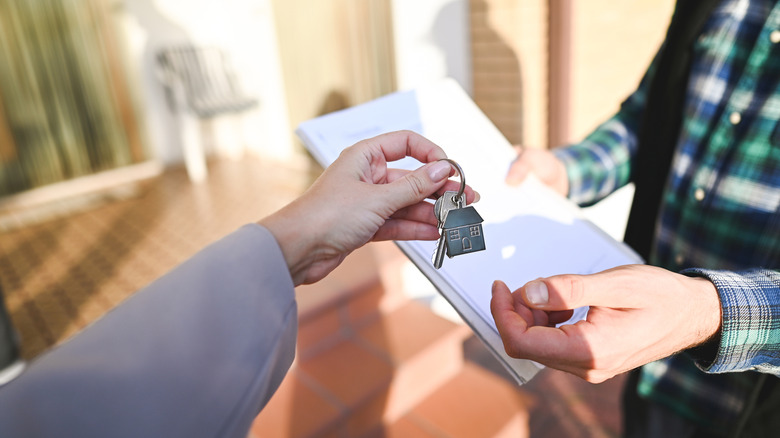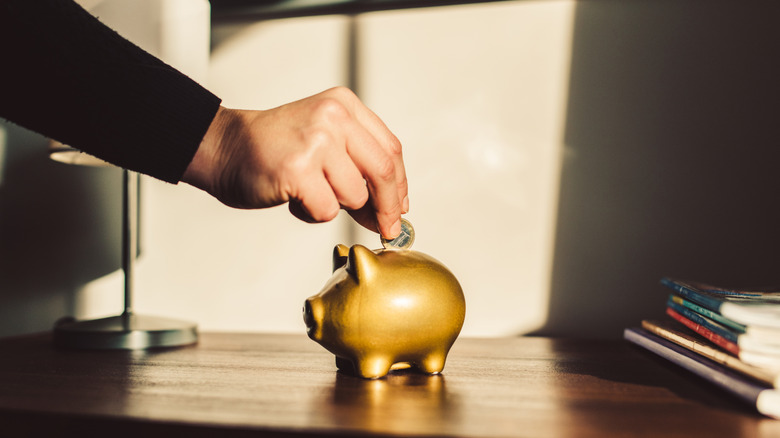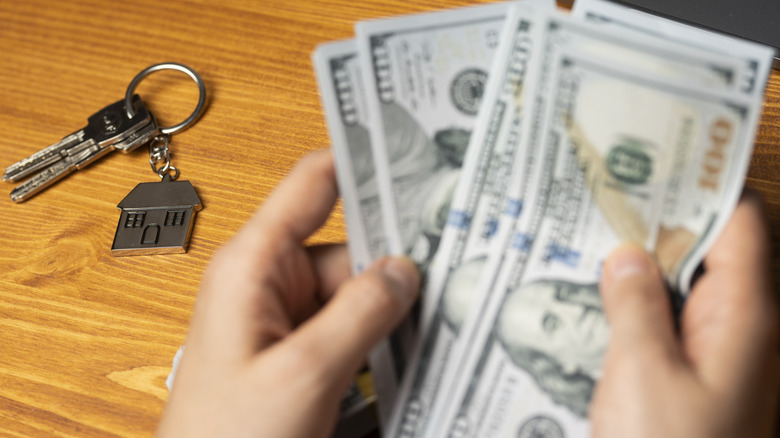Don't Buy A Rental Property Unless You've Met These Savings Requirements
Investing in the real estate market feels like the logical next step in many cases. Buying property offers a two-fold asset that can deliver monthly rental checks to support you in the moment while also leaving you with a gradually appreciating possession that can be sold later. It's a common target for those looking to boost their long-term retirement income, too. But monthly income and an increase in long-term valuation hinges on a long string of responsible tenants. Unfortunately, this can be a tall order — especially for investors managing a property without professional support. For this reason and many others, the real estate market comes with plenty of risk that demands a good deal of financial stability on your part.
When entering into a contract with a tenant, you can't know how they will prioritize their finances, especially if things get tough. You may end up getting the property back in terrible condition, or your tenant might stop paying their rent. All this leads to an important set of prerequisites real estate investors should meet to dampen the potential financial risk and prevent cataclysmic damage to their personal finances. For one, you should have a substantial emergency fund ready to cover unexpected costs related to owning a rental property. Crucially, you should also be able to afford the property without needing to take out a loan — even if you do end up getting a mortgage instead of paying for it in cash.
Build a substantial emergency fund before investing in a rental property
An emergency fund is most important financial marker of a person ready to invest in more expensive, risky assets. Everyone's savings reserve takes on its own format, but a full emergency fund should cover six months' worth of your routine expenses. This means that if you lose your job, you could live largely the same lifestyle without finding work for half a year (although cutting costs is always a key step under these circumstances). If you're thinking of investing in real estate, expanding your emergency reserve to this upper extent is crucial. There's more financial risk involved in your life once you make this leap. Your time is often stretched thin, too, meaning you may need to take time off work to deal with maintenance issues at the rental property.
The average American household spends nearly $6,500 per month, according to a 2023 Consumer Expenditures report from the Bureau of Labor Statistics. To have enough breathing room to keep your personal and investment finances in order, you'll want to aim for a savings figure pegged at roughly $39,000, adjusted based on your own spending, of course. This financial cushion allows you to cover your financial needs in times of strain, but it's also a critical support system in the event of a sudden emergency with the investment property. Say, for instance, the home floods and you need to buy new furniture and appliances. The insurance company may eventually cover it, but your tenant can't and shouldn't have to wait.
Have the ability to purchase the investment property in cash
While it's not strictly necessary to buy a rental property without a loan, the ability to do so is a key savings requirement. Real estate often feels different than other kinds of investments. It's a tangible asset, and one you could live in yourself if you chose to. But the home you purchase is still an investment, much like the stocks or gold bullions you've added to your portfolio. The typical investor won't utilize borrowed money to buy these kinds of assets, so going into debt to invest in real estate shouldn't be the norm, either.
Once you've saved enough cash to buy a property, you have the ability to fund the investment fully, taking most of the profits for yourself. Aside from taxes, operational expenses, and other routine upkeep needs, there are no additional stakeholders to work around. In contrast, with a lender involved, paying off the mortgage comes ahead of any profits you might stand to make, and if things go sideways with a tenant, you might ultimately lose the house to a foreclosure action. Buying in cash allows you to avoid paying interest on the loan, too, knocking thousands of dollars off the total cost of the property. Your cost basis is yet another crucial datapoint when considering stock investments, and it should be carried over into the property market, too.


